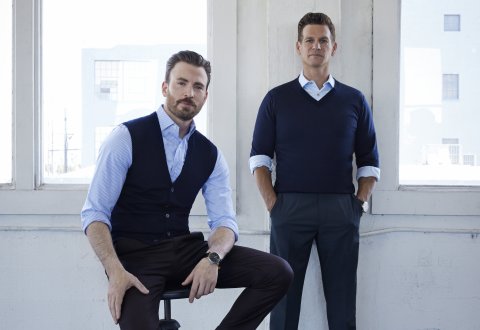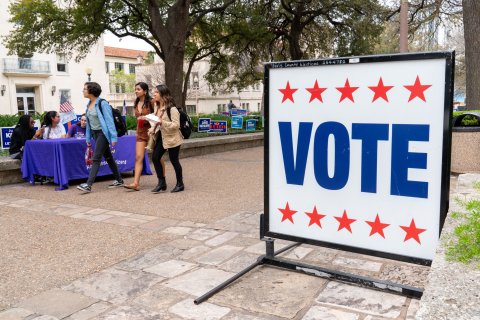Chris Evans is best known for portraying Captain America, who teams up with other superheroes in the Marvel Cinematic Universe to form the Avengers. In real life, Evans has joined director and actor Mark Kassen and health care entrepreneur and philanthropist Joe Kiani to launch a website and app called A Starting Point, with the aim of getting young people interested in learning more about their elected officials and political issues.
Evans and Kassen met with Newsweek's David H. Freedman via Zoom to talk about some of the obstacles they've had to overcome, the success they've had so far and their ambitions for the project.
Newsweek: What were the biggest challenges you faced in getting A Starting Point up and running?
Chris Evans: First we had to collect the interviews. For the first year and a half before we launched, most of what we did was going to Washington, D.C., and knocking on doors to try to collect these interviews. We needed to garner trust.
Mark Kassen: I don't know if you're aware of this, but Chris is famous. Sometimes I just forget that, because I've known him a long time and to me he's just a normal person. So I was surprised when we went to D.C. at how excited and nervous people were to meet him. A lot of them told us that celebrities often come to D.C. to try to tell them what to do. They liked that we were asking them to talk about what they think. And they liked that we weren't just looking for the most exciting, sexy stories. We asked them to talk about some of the issues that are important to them and their states, and that they usually don't get to talk about.
CE: It's a lot easier now that word is getting around. These days we're fielding incoming calls from elected officials who want to be included.
NW: Do you hope A Starting Point can address the extreme polarization among voters and in government?
CE: The site wasn't designed to try and promote bipartisanship. This isn't a therapy session for the left and the right so we can all figure out how to sing kumbaya. It was created to promote engagement with young people. If we don't get more young people to vote we'll never get a government that accurately reflects who we are as a country. We felt the best way to fight apathy and promote engagement is to show the full spectrum of opinions that are out there. A lot of those opinions are different from mine, but I wanted to keep that out of it and let young people decide for themselves.
MK: The two parties seem to shape the narratives we hear on different media outlets. We wanted officials to talk to us about the issues without the narratives.
CE: Young people can detect journalistic spin as well as anyone can. Our guiding principle—and I think it's pretty unique to us—is that we provide this information in a completely unbiased way. The content comes directly from elected officials. Mark had a fantastic idea about our doing profiles of different officials, but I was immediately wary, because it would be hard to do that without letting our own opinions affect how we do them. That could be in part because I am so politically vocal on social media, and I want to make sure that I never let that infiltrate this site. I was really worried that we were going to be branded as some sort of a leftist propaganda machine, that there was some sort of a liberal agenda. But that hasn't happened at all.

NW: How is A Starting Point going to evolve in the coming months and years?
CE: We're used to making movies, where when the movie's done you release it and you can't make any adjustments to it, you can't go back and polish and improve it. But this site is a living thing. We can fix this car while we're driving it down the road. There were certain things that were high priority right out of the gate, including getting elected officials to talk to us, and getting eyeballs to the site. But now that we've done that, we're looking at what else we can do.
We're thinking about Mark's ideas about profiles, or doing other sorts of deep dives. We could take a camera crew and go into an elected official's district and maybe have that person show you around, like a mini-documentary. I think we can avoid that being a road toward partisanship; we'll do it with both Democrats and Republicans. As we establish ourselves as a credible place for honest, balanced information with no spin, we can start bending the mechanisms a little more to start asking more questions.
MK: We're not going to be investigative journalists. But one way we do want to expand our coverage is to go beyond Congress to state legislatures. We'll start doing that next year, and we'd like to eventually involve as many levels of government as possible.
CE: Mark also had the idea of having guest commentaries from influential people who aren't elected officials. It would be a little like establishing an online guest house, where a celebrity or someone else might drop in and do a quick thing on the environment, for example. It would be a good way to get more eyeballs on what we've got here. I've already reached out to a few people about appearing, though some people can be a little scared about weighing in publicly on the issues.
MK: We just have to make sure that we don't suddenly turn this into famous people interviews, and that we don't do things that people can get elsewhere. We just have to keep trying different things to see what works.
NW: Have you thought about moving outside of politics?
CE: Yeah. I'd love doing anything that moves toward providing concise information directly from those who are most informed or most involved on a particular topic, whether it's science, the economy or history. The essence of this site is about understanding who's in office, regardless of their level of expertise in an area, because they're voting on things that will change your life. But when you're talking to elected officials about the economy, sometimes you can't help thinking, shouldn't we be talking to an economist about this?
Or it could be sports. Like you could get LeBron James to teach you the triangle offense. There are a million ways this could evolve, and to be honest most of them would probably be more exciting than politics.
MK: We've been approached by people in finance, where we all struggle to figure some things out. How do we apply our guiding principles to that, or other areas, like health care? We're trying to understand where we can be useful, and as this grows, we'll continue to develop those use cases.
CE: We're lucky that we're self-funded, which frees us from the kind of pressures that other companies have to do what works for their bottom line. We have the freedom to move at our own pace and figure out what will do the most good. One thing we really wanted to do from the beginning was to create ways for in-person engagement in events. That's a great way to get people excited. But then we ended up having to launch during a pandemic, so we had to put that aside. But we're looking at it again now.














